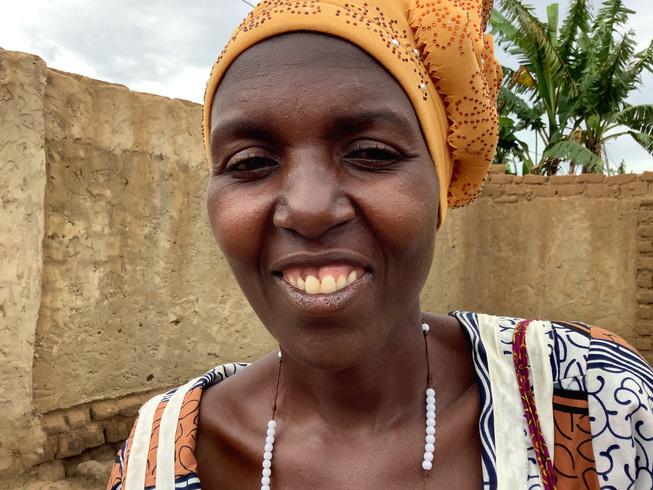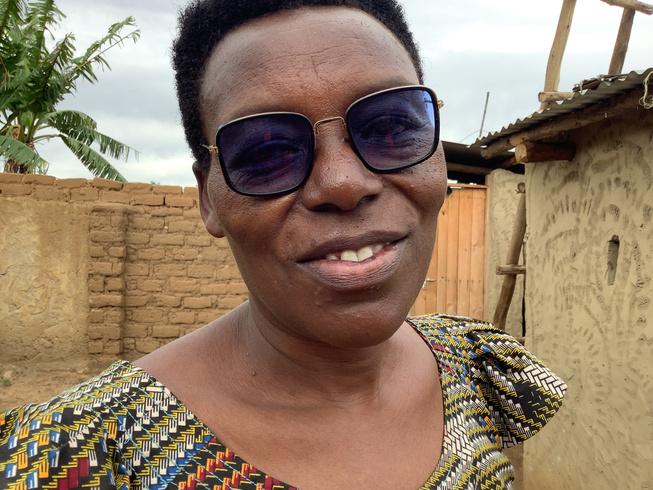
3 minute read
Feedback from the trainees
People giving their experiences show how they can start from zero and reach their goals, not losing their morale I will use this experience capturing people's stories to help people develop their skills. Even those who have lost their morale can, through sharing stories gain back their morale and achieve their targets.
Diana Kakwezi
I'm technology oriented, I like new tech., so I appreciate how we can do things in the field, collecting data from different communities. I liked the way we could capture stories, I liked the teamwork, the planningthe programme was really complex but we managed in just over a week! By changing people's lives you also change yours.
Felix Nzikobanyanka
Before the programme came, others were in darkness, but now everyone is shining because training them how to save is important to their lives. With the training showing you how to save, how to boost your life, stepping up with what you have and become more than you are even expecting is amazing I' d known through them giving their stories what they are facing, what challenges they have, what has changed their lives and what they are planning for the future.
Naomi Musiande
The programme was so fantastic and very helpful. I liked learning how to film and how to work with people in the field. Through different stories we learned, especially through the River of Life, how to give a picture of a story
Simon Kibwila Kimuke
Reaching the field, we took the methodology and it was amazing because we got even more information than we had wanted, but we were offered it because people liked the way we engaged them in the activity. I really learned how a person can really share their voice to be heard outside by way of video and I want to use it in the future where I see a barrier where our voices or the voices of the community need to be heard
Confiance Ishimwe
The most interesting part is the story circle in the field. We were able to relate with our different group members and see the joy of them giving us the results when we were listening to the most significant change stories It's the best way to show what people are going through, or where they come from, what they plan to do and how they want it to be done because it's people-based, and that is a very unique feature of this InsightShare method.
Aqrchet
Diana Salume
This experience has been nice, learning how to get the community to tell their stories, how to use the gadgets, how to edit the stories into movies and how to analyse them We're starting a new project in Rwamwanja (?) next year so I hope we can use the skills and knowledge for this, and for the baseline of a new project we're implementing in Nakivale.
Noah Ssemijja
It was an amazing period I learned how to film with an iPad and I was very happy to meet different people and make new friends. I want to use the knowledge in my community to improve and get good feedback.
Nelly Kamikaze
I loved the participatory nature of the training - not picking out a client or customer trying to understand, but going into the communities and getting them to share their stories and they select the stories to record themselves I want to use the technique to capture stories to understand better what is the impact of our programmes on communities and how to get feedback on how we can improve our services to meet their needs better.
Alice
Norah Lajwa
Learning all the new techniques on how to work with the community in a settlement - these were new skills for me and I want to use them in my future career, to use video as being the voice of the community.
Mazza Dolib
Sources
Asadullah, S and Muniz, S (2015) Participatory Video and The Most Significant Change A guide for facilitators InsightShare, Oxford, UK Retrieved from: http://insightshare.org/resources/ participatory-video-and-the-most-significantchange/
Benest, G. (2010). A Rights-Based Approach to Participatory Video: toolkit. Oxford: InsightShare/UNDP
Davies, R., Dart, J. (2005) ‘The ‘Most Significant Change’ (MSC) Technique: A Guide to Its Use’, MandE, Melbourne, Australia
Guijt, I. (1999) Participatory monitoring and evaluation for natural resource management and research. Socio-economic Methodologies for Natural Resources Research Chatham, UK: Natural Resources Institute
Milne E, Mitchell C & de Lange N (eds.) (2012) The Handbook of Participatory Video. Lanham MD, USA: AltaMira Press
Most common countries of origin of refugees in Uganda as of 2022: Statistica, last accessed at www.statistica.com/statistics/1241293/refugees-in-uganda-byorigin
Multidimensional Poverty Index Report 2022 - Uganda - Uganda Bureau of Statistics (UBOS) in partnership with OPHI and th eUnited Nations Development Programme (UNDP). last accessed January 2023 at: https://ophi.org.uk/mpi-report-2022uganda/#: :text=About%2027%25%20of%20the%20population,by%20the%20li ving%20standards%20dimension.
Participatory Video Baseline, Refugees: Innovation, Self-reliance & Empowerment (RISE) Programme Report: Sabine Hellmann and Soledad Muñiz (2020)
Participatory Video and Most Significant Change - Midline and Endline Evaluations: Mainstreaming Disability Inclusion in the Ugandan Financial Services Sector: Tricia Jenkins and Soledad Muñiz, (April 2022 and October 2022)
Project summary document: Sally Vicaria, International Programmes Director, OI: Mainstreaming Disability Inclusion in the Ugandan Financial Sector
Appendix One: Participants in the field (excluding the PV MSC video storytellers)
Day One - Wenzetu












